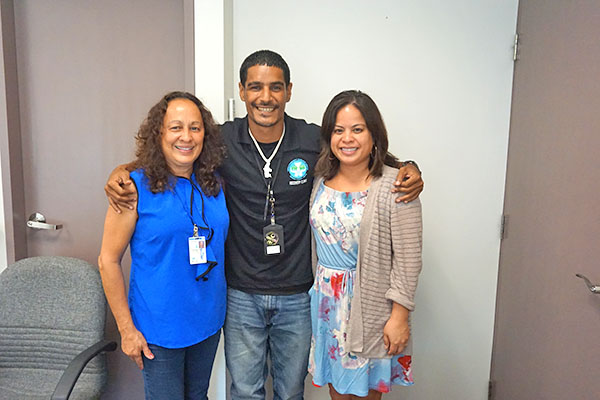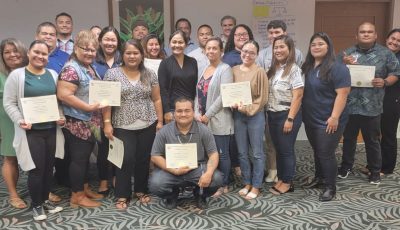WHEN IT COMES TO MENTAL AND EMOTIONAL HEALTH,
No man is an island

From left, Nadine Hamilton-Sablan, AJ Mettao, and Glenda S. George-Benavente of the Community Guidance Center. (Bea Cabrera)
The line that “no man is an island, no man stands alone” may be clichéd but is true, especially when it comes to taking care of one’s mental and emotional health.
AJ Mettao, a behavioral health tech at the Community Guidance Center, certainly believes so. “First thing that a person should think about when it comes to achieving a healthy mental and emotional health is that he or she is not alone. It’s a common feeling and a lot of people have those feelings, so never feel like you’re the only one who thinks this way because many people think the same,” he said.
“Personally, I think it’s a normal feeling and the key is to allow it to pass. It only becomes an issue or problem when you hang on to it, when you feed it, and when you keep on giving it life and energy. Many people go through doubts, negative thoughts and feelings of inadequacy. Those are all normal feelings and don’t feel alone. Just let it pass as any emotion should,” he added.
Nadine Hamilton-Sablan, director for CGC, said that what we think and feel determine our mental state. “We always need to have a balance in our thoughts and emotions so that we can better interact with other people… we are social beings and we have to interact with people so what you think and feel becomes you,” she said.
“If you feel overburdened, you need to seek help. People in the community are actually ready to help and just by talking to the person—someone you work with, your mother, sister, friend or anyone—helps a lot,” she added.
Mental or emotional health problems can happen to anyone and the way to counter it is to be aware of it as a step toward getting empowered.
Clinical services officer Glenda S. George-Benavente said that empowering one’s self is important in overcoming mental and emotional problems. “Empowerment is learning how to cope and experiencing hardships and going through it on your own. Whether it is the right decision or not, you will eventually figure it out.”
“Sometimes you just have to fall to pick yourself up and then say I can do this, I’ve gone through this and whichever way it was, it was you who made your way up. The support of family and friends will help but doing it on your own and making it marks true success—of being able to overcome life’s challenges,” she added.
Mettao echoes George-Benavente’s thoughts about empowerment. “Most of the participants that come in, we empower them…we help them realize that it’s within themselves that they can figure out what works for them…Empowerment means giving them tips like you can do this, check out what works for you. This makes them stronger because of the thought, ‘Hey, I handled this on my own’ and this makes them realize they are strong and can take care of things.”
“I think that’s the basis of CGC: to empower the community to make you feel like you are in the driver’s seat, you are in control and it’s not one of those things you can’t handle because, at the end of the day, you just need some guidance,” he added.
There are no specific criteria why and how some people eventually have mental and emotional problems—it could be genetics or circumstances—but whatever it is, getting help and support are equally important.
“Embrace who you are…we value each and every person for what they bring. We are looking at social support, that’s a big factor in our program at CGC. We are also bringing in cultural activities to help build that foundation so people will have an environment that is continuously growing,” George-Benavente said.
“Simply put, we need one another, we need others to survive and just like the saying goes, ‘It take a village to raise a child,’ especially on this island that is small, we need all the help we can get,” she added.
The Community Guidance Center is a division of the Commonwealth Healthcare Corp. For more information about its programs, visit them at the second floor of the TSL Plaza in Garapan or call (670) 323-656560-61.



























